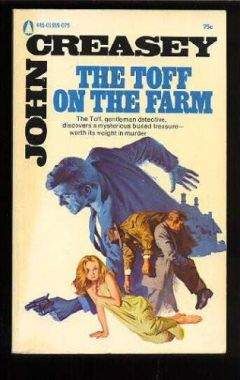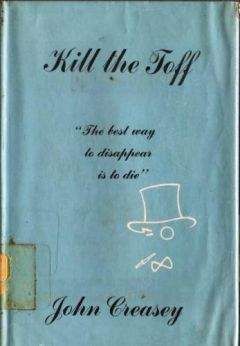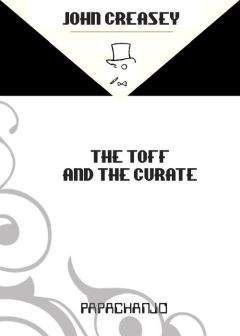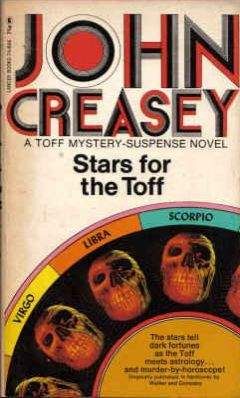John Creasey - The Toff and The Lady
As Rollison put his key to the lock, the door opened and Jolly appeared.
“I’m very glad to see you, sir.” He stepped aside and then closed the door softly. Rollison stood watching him curiously. “Can we have a word together before you see Miss Barrington-Ley?” Taking assent for granted, he walked to the door of the small spare room. Rollison followed.
“We’re being very conspiratorial, aren’t we?”
“I think you will agree with the need for discretion, sir,” said Jolly, firmly closing the door. “Miss Barrington-Ley is in a state of some agitation, and although I have done my best to find out the cause for it, I have failed. However, I did manage to get some indication. I took the morning newspapers in to her, with The Record uppermost and folded so that she could not avoid seeing the photograph, and she showed some alarm.”
“Is alarm the word?”
“If you had been with me, I am sure you would have said so,” declared Jolly. “There was, also, some suggestion of distaste. I thought it wise that you should know before seeing her, sir.”
Yes,” said Rollison. “Thanks.”
“Excuse me,” said Jolly.
He went out ahead of Rollison, stepped to the front door and opened it, and then said in tones of delight:
“Good-morning sir!” He glanced at Rollison. “Miss Barrington-Ley has been waiting for some time.”
By that time Rollison had joined Jolly and the door of the living-room had opened.
Gwendoline Barrington-Ley stood in the doorway. She was taller than either her father or her mother, with an attractive figure not shown to advantage by a mannish tweed suit. Woollen stockings made her legs took sturdy. She wore a Tyrolean hat with a blue feather in the band, and on Gwendoline a Tyrolean hat looked slightly raffish.
“Hallo, Gwen!” said Rollison, stepping towards her with outstretched hand.
“Have you seen my mother to-day?” demanded Gwendoline.
“Why, no,” said Rollison.
“Thank heavens for that!” She took his hand and drew him into the room-. Her features were good, and with the right make-up she would have been attractive, but she scorned rouge and lip-stick. There was too much powder on the side of her nose, and it was nearly white—she needed a deeper shade to match her olive skin. Her grey eyes were very clear.
“Now what is all this?” demanded Rollison.
“Shut the door, please,” said Gwendoline, and would not go on until he had done so. Then she burst out: “It’s that dreadful woman!”
“There are so many,” murmured Rollison.
“You know what I mean. The woman who says she has lost her memory: Lost her memory!” Her voice was biting with contempt. “Rolly, I hate coming to you like this, I hate asking anyone to put themselves out, and if this were for my sake only I wouldn’t dream of it. But—well, there’s mother and father.”
“Oughtn’t we to start at the beginning?” asked Rollison. “And also be comfortable?” He led her to a chair and offered her cigarettes. She drew on one deeply, and when he was sitting in an easy chair opposite her, she began to talk in a low-pitched voice, quite determined that no one outside those four walls should hear.
“I don’t know when it really began. I do know that this woman is an impostor—lost memory indeed! she knows who she is as well as I know who I am. It’s a trick to outwit father, and she will do anything she can to make a fool of him, of that I’m quite sure. She’ll be absolutely ruthless, too, she won’t mind what trouble she causes between”
Gwendoline broke off, and bit her lip.
“This is in the strictest confidence,” murmured Rollison.
“Yes, I know, but—well, all right! Between Hilda and David.” She seemed to find it easier when she used the Christian names of her father and step-mother, and Rollison needed no more telling that she looked on them both as her natural parents. “I was there when she came in—I nearly had a fit! If you had seen David’s face you would know what I mean.”
“So he knows her,” said Rollison.
“Oh yes, although he pretends that he doesn’t. I often go to the London office, you see, and I was there when she came to see him, about ten days ago. Last night she looked like a ghost—on the previous occasion she looked like a Jezebel!”
“Strong sentiment,” murmured Rollison.
“Nothing can be too strong for her!”
“As I don’t know the lady, I can’t be judge,” said Rollison.
“You’ll have to take my word for it,” said Gwendoline. “I am quite sure that there is nothing that woman won’t do if she sets her mind to it. I can only tell you that she has seen my father before, and that when she left his office he looked like a ghost. I think she is blackmailing him, but I can’t be sure. I know that he has behaved most oddly since that time. Normally you can set your clock by him—oh, he’s always in a hurry but he’s never late for an appointment, and if he says he will be home by seven or any particular time, you can rely on his getting there to the minute. That is, you used to be able to. Since he saw the woman, he’s been unreliable, almost irresponsible. I feel sure that he has been meeting her.”
Rollison looked at Gwendoline’s flushed face and angry eyes, and said deliberately:
“If you think there is an affaire, I can hardly interfere.”
“I don’t believe that David would sink to that!” said Gwendoline. “No, it’s something much more than an affaire, and the woman has chosen this way of wishing herself on to us. Hilda has already suggested that when she leaves the nursing home she should come to stay with us for a week or two, and David hasn’t made a demur. That’s unlike him, he usually prefers to have just Hilda and me at the house, and dislikes it when we have to do much entertaining. He’s a man of very few social contacts; he spends his life at his work, and the only rest he gets is with us. Now this woman is preventing him from getting any rest. There are times when he looks positively haunted! I knew when Hilda suggested that she should stay that he hated the thought, and yet for some reason he couldn’t refuse.”
“What prompted Hilda to be so kind?” asked Rollison.
“Her own generous heart,” said Gwendoline, and contrived to prevent the words from sounding trite. “She is quite the most generous person alive. If there’s a suggestion that anyone is in difficulties she’s on the spot as soon as she can get there. Surely you know her well enough for that.”
“Of course,” said Rollison, although he would not have rated Hilda quite so high. “Well, what do you want me to do?”
“Find out the truth about this woman.”
“Anyone who claims to have lost her memory comes under the jurisdiction of the police, you know, and they’ll find out who she is and whether she is telling the truth. They’re not unused to people who pretend.”
“Oh, the police,” said Gwendoline, scornfully. Then her eyes widened with alarm. “The police! I hadn’t thought of that. You can’t tell what clumsy idiots like policemen will do or say, they haven’t an ounce of tact in their make-up. Why, they might discover that the woman’s seen David before and tell Hilda without stopping to think.”
Rollison laughed.
“You’re too hard on the police.”
“I’m not,” said Gwendoline, warmly. “I’ve had some dealings with them over parking my car—they’re always unimaginative and sometimes unbelievably dense. Don’t grin like that! Rolly, will you help?”
“Why did you select me?” asked Rollison.
“Well, everyone knows that you’re interested in mysteries, and this is a mystery. Don’t forget that David is a banker of some standing. He has a lot of influence, and his support for a project, for instance, would persuade a lot of other people to support it.”
“What kind of project?”
“A loan, or a new Company, or something like that,” said Gwendoline. “This is exactly the kind of mystery which should interest you, and—well, we have some claim on your friendship, haven’t we?”
“You certainly have.”
“Then you’ll help?”
“If I can,” said Rollison, “and without admitting that you’re justified iii being alarmed. Let’s go back to my question— why select me? I don’t think you would pay much attention to the rumours concerning me. You’re not usually interested in anything that makes for notoriety. I would have put you in the category of those who strongly disapprove of my goings-on.”
Gwendoline coloured furiously.
“Well, sometimes I have, but—well, everyone knows that you’re sometimes called The Toff and that you do seem to have some influence with the police. As a matter of fact, I’m interested in the psychology of crime, and I’ve followed some of your cases. In their way they have been quite interesting.”
“Thanks,” said Rollison, humbly. “Have you ever written to me, Gwen?”
He felt quite sure that if she had first sent the photograph to arouse his interest, and was now following that up, he would have got some indication from her reaction. She looked blank and a little impatient, and at the same time puzzled.
“I sent you the invitation to the Bal Masque, didn’t I?” she asked. “Why do you ask?”
“I had an unsigned letter to-day on die lines of your diatribe about the lady.”
Gwendoline sat very straight in her chair.
“I do not send anonymous letters!”
“People do unexpected things when they’re driven to desperation,” said Rollison. “It rather looks as if someone else takes an equally poor view of the loss of memory, doesn’t it?”
“That shouldn’t surprise you.”
“I suppose not. Have you ever talked to the woman?”
“No.”
“Nor met anyone who knows her well?”
“No. If I could give you any more information I would, but surely you’ve enough to start work on.”
“I could hint broadly to your father”
“No!” Gwendoline rose abruptly from her chair and stood over him. “No, you mustn’t do that. He would know in a moment who had put you up to it. If I thought it would do any good to question him I would speak to him myself, but there must be some reason for him keeping it secret, or he would have told us by now. Rolly, don’t be indiscreet. I’m relying on you to—to make sure that”
She broke off, at a loss for words. Rollison stood up and lit another cigarette for her. He promised her that if there seemed any way in which he could find out the truth, he would try to help. The suggestion of speaking to David Barrington-Ley had upset her so much that he found it necessary to talk for several minutes before she calmed down and looked at him a little shamefacedly.
“I’m afraid I’ve been nearly hysterical,” she said.
“Not a bit! And I’m glad you managed to stop me from talking to Hilda before I saw you. How did you find out that I might be going to see her, by the way?”
Gwendoline stared at him, wide-eyed.
“Were you at the house?”
“Yes.”
“What on earth made you go there?” demanded Gwendoline. “Jolly told me that you were out, I’d no idea where you’d gone. Rolly! Did you know there was any reason to think
that this woman was trying to influence David?”
“I hadn’t a notion,” said Rollison. “The anonymous letter included a photograph, and a photograph and a story were in The Record. As I told David, when I met him coming out of the house, idle curiosity took me along. So you see I’ve already an excuse for being a prodnose!”
“I can tell you one thing,” said Gwendoline. “Nothing you say will make mother change her mind; when she’s set on helping someone in distress there’s just no holding her. Don’t let her think that you’re unfriendly towards this woman, will you? Otherwise she’ll probably get difficult and be as unhelpful as she can.”
“I’ll be very tactful,” Rollison promised.
He saw her to the door, and she hurried down the stairs. Looking out of the window, he could just see her on the pavement immediately beneath him. She spoke to the taxi driver, who was still there. The man’s words floated upwards.
“Sorry, I’m engaged.”
Gwendoline walked on, and Rollison looked towards the little green car. It began to move. He stepped swiftly to the door and called for Jolly, and his man appeared from die main bedroom.
“There’s a taxi downstairs,” said Rollison. “The driver’s acting under my orders and is about to follow a green car that’s just started after Miss Barrington-Ley. Hurry, Jolly!”
“At once, sir,” said Jolly, and, taking his bowler hat and his furled umbrella from a hall-stand, he hurried downstairs. Rollison returned to the window in time to see him step into the taxi as it moved after the little green car.
CHAPTER FOUR
THE TOFF MEETS THE LADY
ROLLISON turned away from the window and sat down. He leaned back and contemplated the ceiling, lit a cigarette and, after a few moments, hummed, Why oh Why oh Why with some gusto. He was not thinking about popular songs, however. He was thinking of the curious fact that the Barrington-Leys appeared to be associated with the mysterious lady, and the even more significant fact that Gwendoline was greatly disturbed. Her excitement and hysteria—and in so staid a person as Gwendoline her behaviour had amounted to hysteria—had not quite rung true. It would not surprise him if she had behaved in this manner solely in order to arouse his interest—with the same purpose, in fact, as the sender of the photograph.
One fact had emerged, obvious enough and yet he had missed it before. The photograph had been sent before the lady’s arrival at Barrington House. Consequently the sender could not have expected him to see another likeness in The Record.
The grandfather clock behind him struck one o’clock.
He sat up, stubbed out his cigarette, and picked up his hat. He wished he could have followed the green Morris, but there was no telling how long that trail would take.
He had lunch at a small restaurant which served the flat in Gresham Terrace, and then took a taxi to the Lawley Nursing Home, which was in Grosvenor Place. He was most anxious to meet the lost lady.
A stately, well-preserved woman in a navy blue dress received him. With his card in front of her, she was very gracious; how could she help Mr. Rollison?
Rollison said, mildly, that he would very much like to see the patient who had lost her memory.
“Why, do you know her?” asked the stately woman, who was the matron.
“I think I might,” murmured Rollison.
“I do hope you do,” said the stately woman. “We all feel so desperately sorry for her, Mr. Rollison; we have had some experience of amnesia cases, you know, and I assure you that there is nothing more distressing. She is not well, of course, but we have little doubt that she will soon be physically herself. As for her memory”




